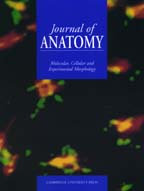Article contents
The role of Bapx1 (Nkx3.2) in the development and evolution of the axial skeleton
Published online by Cambridge University Press: 23 August 2001
Abstract
The bagpipe-related homeobox-containing genes are members of the NK family. bagpipe (bap) was first identified in Drosophila and there are three different bagpipe-related genes in vertebrates. Only two of these are found in mammals, the Nkx3.1 and the Bapx1 (Nkx3.2) gene. The targeted mutation in the mouse Bapx1 gene shows a vertebral phenotype in which the ventromedial elements are lacking; these are the centra and the intervertebral discs. In addition, a region of gastric mesenchyme is abnormal. This mesenchyme surrounds the posterior region of the presumptive stomach and duodenum, and in the mutant fails to support normal development of the spleen. In Drosophila, bagpipe has a role in gut mesoderm and the mutant embryos have no midgut musculature. Thus bap related genes in mouse and Drosophila have roles in patterning gut mesoderm; however, neither of the mammalian genes has a discernible role in the gut musculature. In contrast, both mammalian genes have roles in developmental processes that have appeared recently in evolution. The Bapx1 gene found in fish, amphibians, birds and mammals appears to have derived vertebrate specific functions sometime after the split between the jawless fish and gnathostomes.
- Type
- Research Article
- Information
- Copyright
- © Anatomical Society of Great Britain and Ireland 2001
- 1
- Cited by


